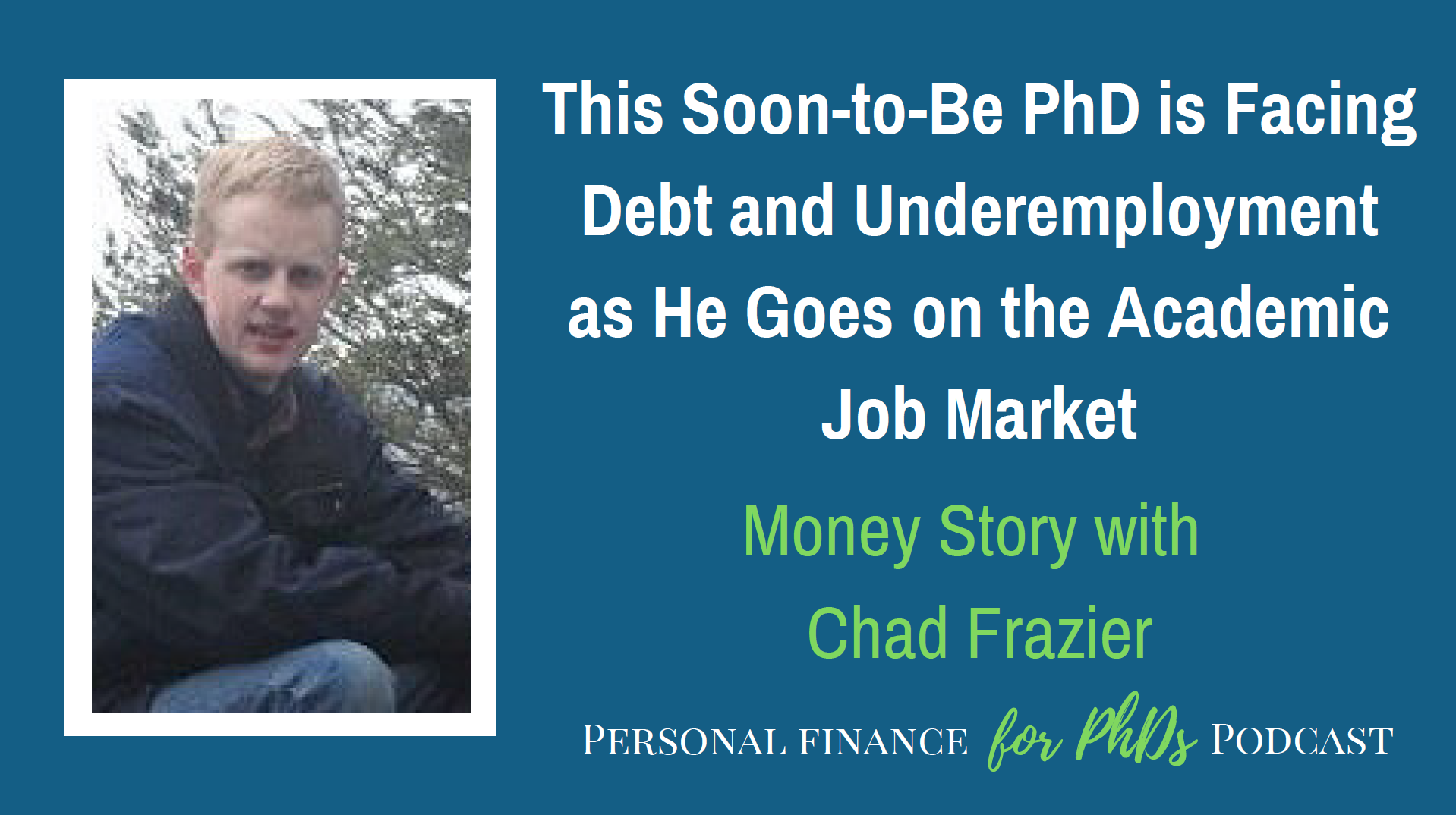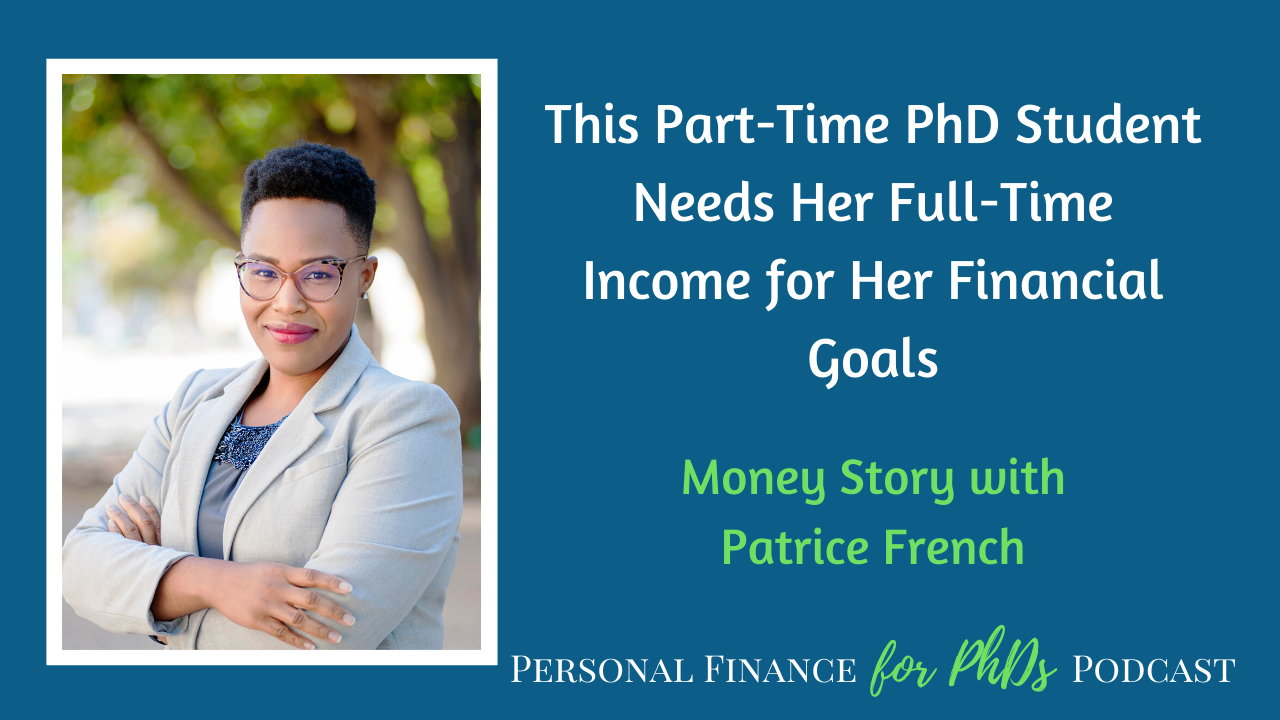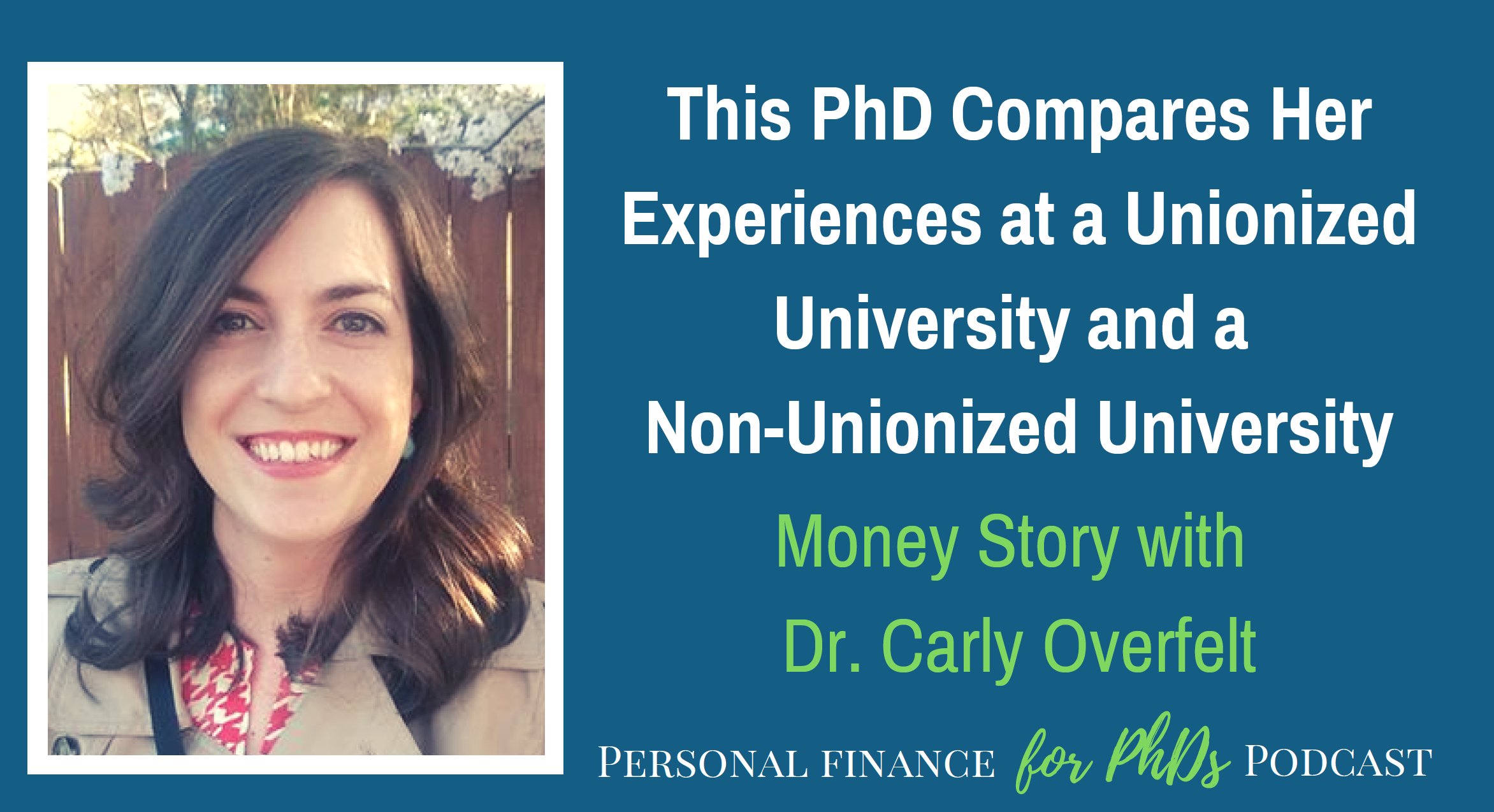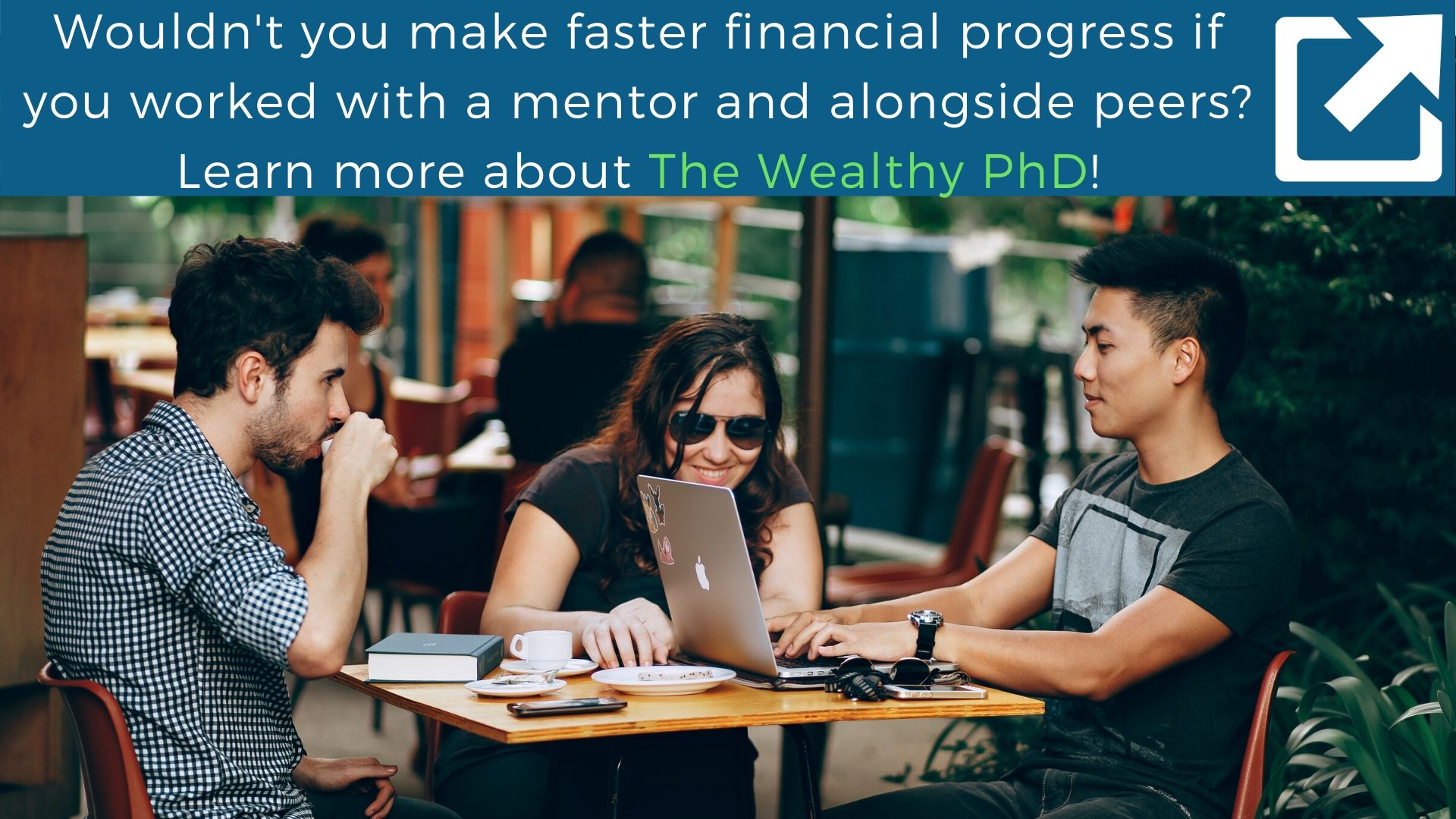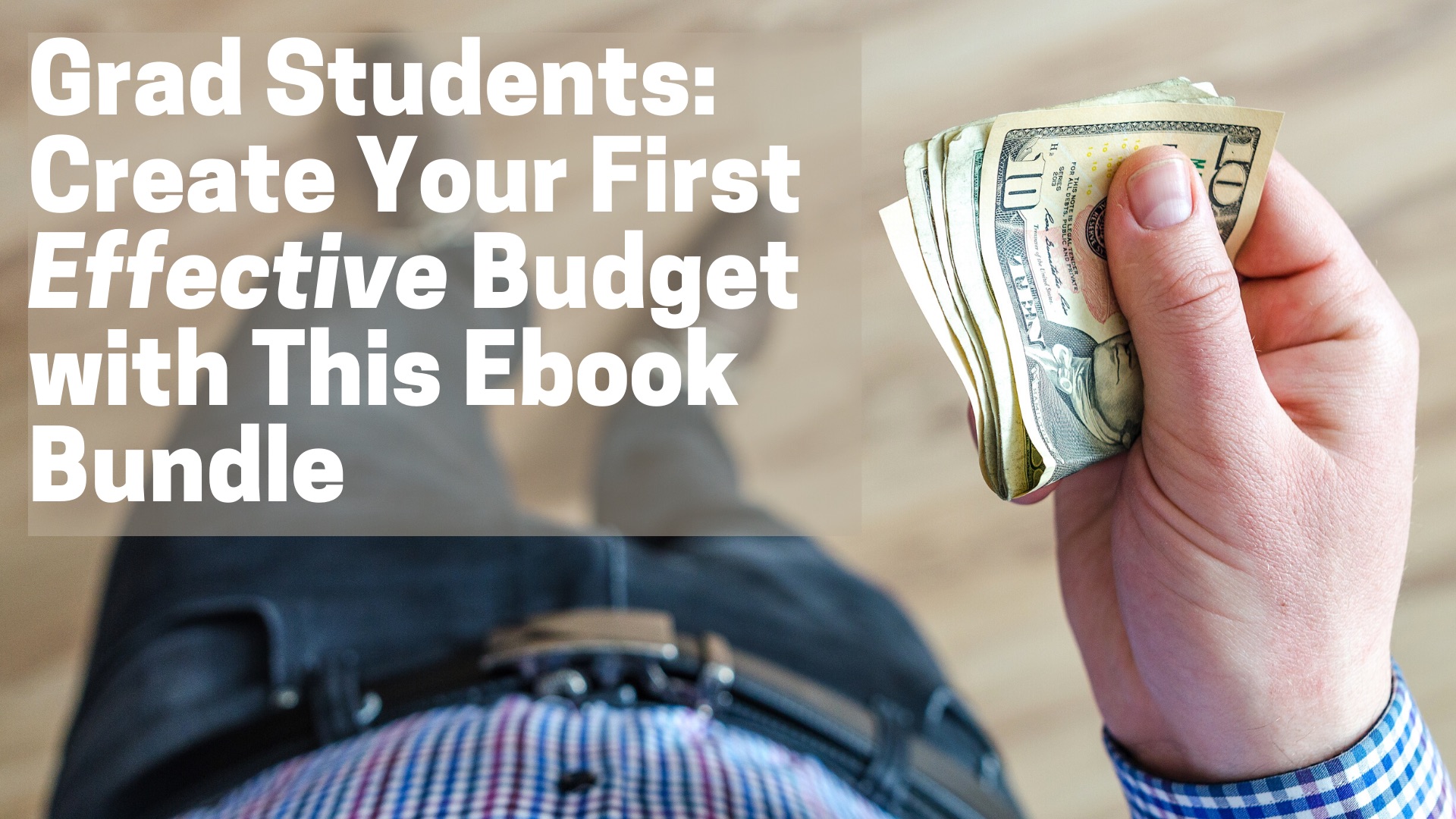In this episode, Emily interviews Chad Frazier, a graduate student in history at Georgetown University who is about to complete his PhD and go on the academic job market. Chad’s career plans and personal finances have changed a lot during his PhD (and a master’s before that). When he received his stipend offer from Georgetown, he thought he had made it. But seven years later, the pay increases haven’t kept pace with housing prices in DC, and Chad has accumulated credit card debt. As he applies for faculty positions, Chad faces underemployment, and the grace period on his student loans from his undergrad and master’s degrees is quite limited. Chad argues that universities have a moral obligation to pay their grad students a living wage so that they can thrive academically. (Update: Chad successfully defended his PhD just prior to the publication of this episode!)
Links Mentioned in the Episode
- Personal Finance for PhDs: Personal Finance Coaching Sign-Up
- Personal Finance for PhDs: The Wealthy PhDs Group Program Sign-Up
- Personal Finance for PhDs: Podcast Hub
- Personal Finance for PhDs: Subscribe to Mailing List
Teaser
00:00 Chad: I just spent the last 10 years at an institution, and I’m now actually financially worse off than I was when I started. At times that makes me really scared and angry. And that wasn’t something that I imagined it would be like when I would get to this point.
Introduction
00:21 Emily: Welcome to the Personal Finance for PhDs podcast, a higher education in personal finance. I’m your host, Dr. Emily Roberts. This is season four, episode 16, and today my guest is Chad Frazier, a rising eighth year PhD student in history at Georgetown. Chad and I discuss some really tough and even emotional issues in this interview including large student loan balances, credit card debt, underemployment, the difficult academic job market, and the feeling of being let down by your university. Chad shares quite openly the current state of his finances and career aspirations. We discuss what universities can do to alleviate financial stress among their grad students as well as what prospective grad students should think about when they look at a stipend offer letter. Without further ado, here’s my interview with Chad Frazier. You don’t want to miss this one.
Will You Please Introduce Yourself Further?
01:15 Emily: I am joined today on the podcast by Chad Frazier, who is currently a PhD student at Georgetown. And we’re going to be talking about the financial issues that arise, particularly as you’re getting close to the completion of a PhD. Right? You’re getting to to the end of graduate school, and what happens next and how do you handle that with your finances? It’s a really challenging situation for many, many, many PhDs. So Chad, I’m really delighted that you joined me today. And will you please tell the audience a little bit more about yourself?
01:46 Chad: Yeah, sure. First off, happy to be on the podcast, Emily. So just kind of a little background. I’m, like you said, just in the process of finishing up my PhD. I’m kind of planning to defend middle to late part of September. I focus on US history. Before that, I got my MA at Georgetown, which is the institution I’m currently at, BA at Dickinson. I guess those are kind of the broad highlights. I’ve been in the last couple of years, very active with the graduate union here at Georgetown. I’m part of the organizing committee and started getting more and more interested as part of that work in the last couple of years.
Evolution of Career Plans in Grad School
02:32 Emily: Yeah. Super interested here. Maybe not specifically about the unionization issues or your role in that, but just about your thinking around those issues as it relates to what we’re going to be talking about today. So, you’re almost done with your PhD. What are your current career plans, what you think you’ll be doing next, and also maybe how has that changed over the course of your degree?
02:54 Chad: Okay. Yeah. So when I started out the PhD, which would have been fall of 2012, the plan was generally that I was going to just tenure track, ideally at a liberal arts college. I was a peer writing tutor in undergrad and I really liked the experience of teaching. That said, I was kind of amenable to the idea of like maybe doing alternate career paths, kind of sidetracks, that led eventually to this final goal. But I can’t say that I really thought about them in any sort of depth. I think I figured, “Oh, I’ll just figure it out as I go.” So, like last year, I tried the academic job market for the first time, kind of a soft search. I didn’t get anything, which was not unexpected where I was with my dissertation. And then I’m going to try it again this year–be better, generally more competitive I think–and we’ll see what happens there. But over the course of the sort of last several years, I have just gotten more interested in other possible career paths. Because there are maybe some things about academia that I’m not always a fan of. And I think in particular, one would flag, like I mentioned, the unionization, maybe involvement with something to do with the labor movement, either as an organizer or researcher for a union. I’m also working with a professor here on building an online archive. So it looks at teachers in the labor movement. So it’s kind of up in the air.
When Does Your Graduate Student Position End?
04:18 Emily: Yeah. So it sounds like you’re getting other kinds of work experience. Right? Other kinds of, or not necessarily work, maybe it’s volunteer as well, but other kinds of experiences that’ll help you figure out what you want to do with your career and maybe you know, land, whatever that next job is. So you said you’re planning on going back on the job market again this fall. When does your position as a graduate student actually end or do you have an end date for that?
04:41 Chad: So I actually just put in paperwork with the graduate school. So the way this basically works is, I will defend, ideally late September. Once I do that, and generally, I am sure this is true for a lot of people, the assumption is that when you get in the room, you’re ready. Then there are revisions, which part of that is what your committee says, part of it is shaping it to the graduate school. And, as far as the university is concerned, when I’m in that mode, I’m still a student. And it’s just then once those are done, you file it with the graduate school, and then you apply to graduate, which for me the plan is to do that in December.
Plan for Income Until Graduation
05:24 Emily: And so as far as your income goes, in the meantime, do you have an assistantship that’ll still be ongoing, or what’s the plan for the income?
05:32 Chad: So the plan for the income by sort of Georgetown rules is basically after seventh year, which my seventh year technically concluded in May, I’m not eligible for any kind of assistantship, whether as a TA or an RA. So, the work I’ve been doing with the online archive is paid out of an Institute here at Georgetown called the Kalmanovitz Initiative. And I’m figuring out how many hours they will be able to pay me for that. But I’m also looking for sort of part time jobs. One of the advantages of being in DC is there’s a fair amount of work for research with journalists or stuff like that to kind of make enough money that I can make ends meet until I can have something more definite.
Are You Considered an Employee at Georgetown?
06:20 Emily: So, the position that you’ve had at Georgetown, not your assistantship, are you an employee technically or is that like an independent contractor position?
06:32 Chad: So, I’m an employee. It’s routed through sort of the student payroll office. It’s a little complicated just because the way the rules are here with PhD students, we have to estimate how many hours a week I plan to work and how many weeks. And then they are like, “Oh, this is his stipend.” And then that gets dispersed out in biweekly installments. They changed that recently. It used to be able to have been, oh, just hourly, as long as I didn’t exceed like some certain restraints, that would have been fine. Bureaucracy.
What is the State of Your Finances at this Point?
07:05 Emily: Yeah. So, it sounds like you have a part-time position that’ll be ongoing through Georgetown. And then on top of that you do need to work a bit more as well as actually finishing up your dissertation and doing the defense and all of that. So, it’s a lot going on at this juncture. It’s a time of transition and a challenging time. So, can you tell me a little bit more about the state of your finances at this point? It sounds like, well first of all, is that income that you anticipate making going to be enough to sort of keep your head above water or is that still a question mark?
07:43 Chad: So, the way it’s kind of shaping up is that income that I’m going to get from the job with KI, with Kalmanovitz Initiative, probably I’m hoping that’s enough to cover rent. And then the additional work–the idea is basically enough that I can feed myself and pay for Metro and sort of living expenses and hopefully get enough too that I can start paying down credit cards a bit more. Because I’m very cognizant of the fact that, six months after I graduate, the student loans are going to start coming due. And that’s going to drop like anvil from heaven, it feels like. So, I want to have hopefully something ready for that where I’m not getting hit from two sides.
History of Chad’s Student Loans
08:37 Emily: Yeah, totally. So, you’ve mentioned you have student loans. Do you want to share like the amount of that, or like which degree you accumulated them from?
08:47 Chad: Yeah, sure. So, I went to a private liberal arts school, Dickinson College, for my undergrad. And I got lucky. I got a pretty good financial aid package there that most of it consisted of scholarships and grants. And I only had to take out, I think, anywhere from 10 to 20,000 [dollars]. Most of the student debt I’ve accumulated was because of my master’s degree that I took before I started my PhD. And for that, I basically have to look through the records and that’s about 80 to 81,000 dollars. So that’s, yeah.
09:20 Emily: Yeah, that’s going to be a large minimum payment. Even if you go one of these income-driven routes, depending on what you’re doing the rest of the year, assuming you haven’t gotten like a full-time faculty position yet. Anyway, it’ll be a large payment, presumably. So, that sounds really, really tough, but it’s also pretty common as you might imagine. Okay, so you have the student loan debt from your earlier degrees, not from the PhD itself. And then you mentioned credit card debt. Do you want to share the amount of that, and how it was that you accumulated it?
Accumulation of Credit Card Debt
09:54 Chad: Yeah, because I’m not sure. I don’t think I can pull the dollar amount right off the top of my head. But it’s basically–so, a little background about how a PhD sort of works at Georgetown. I was admitted with a five-year package, which meant that for three years there was a service obligation, which I TA’d. Two years was non-service. And then basically, for year six through seven, the department was able to fund me kind of on a discretionary basis. I got a fellowship my sixth year where I got to teach my own class, and then I got a semester of non-service. And then this last year I was on service. And I got a decent enough job working kind of as an administrative assistant to a professor. But the big issue was, that fellowship when I was getting paid was only nine months out of the year, which is pretty common for humanities and social science students here at Georgetown.
10:55 Chad: And so that meant that like, I tried to set aside money so I could cover rent. I would basically always try to find an extra, some sort of job either during the semester where I could save up money or a job during the summer where I could kind of live off of that. Invariably, credit cards became the sort of go-to during the summer. And the usual MO is, in the summer months, pay them down during the year, and then in the summer months make minimum payments until–maybe a little extra if you can–you get back into the fall, and then start paying them down again. And that worked actually pretty well the first couple of years. It’s just in the last two, three years, cost of living has been going up in DC with rent. And also with like, you know, last summer I had three really close friends who got married, and I wanted to go to their weddings and I had to pay for that. And I went to a conference in November that I didn’t get reimbursed for that was on the West coast, which was expensive. And it’s been hard to sort of do that, pay it down this last year where, come June, they were all maxed out, and I just was boxed in.
12:15 Emily: Yeah. I think what you’re describing is super common for PhD students, for people in their twenties and thirties, generally. I mean the nine-month pay, of course, is fairly unique to our mode of work, depending on what kind of field you’re in. But yeah, I mean it sounds like you had the right idea, right? Save up during the year, so you’re cognizant of that in advance. You’re trying to plan for it in advance, save up during the year, live on that over the summer, plus you work a little bit. But it’s really hard to do that planning. It’s just a really, really challenging situation to be in. So yeah, it sounds like credit cards came into that for you as well as the whole irregular expenses thing, you know, going to people’s weddings. I also really value attending weddings.
13:00 Emily: I love being able to go, I always had to travel. It was a challenge, financially. And what you mentioned, of course, the conference thing. We all know inside academia that conferences either are not paid for at all for students, or the student has to pay upfront and then the reimbursements, and it’s months later. That can definitely get people into cycles of credit card debt as well. It’s a huge, widespread problem, I would say. So, I’m sure all of this sounds very relatable to the audience, and I’m really thankful to you for sort of bearing yourself this way and sharing this because it is a really difficult thing to talk about publicly. So, thank you so much for doing that. Is there any other debt that you’re dealing with at this point aside from the credit cards and student loans?
Any Other Debt Besides Credit Cards and Student Loans?
13:41 Chad: I think those are the two biggest sort of issues. Like, yeah, there’s nothing else really out there. I rent so I don’t have to worry about like a mortgage. I don’t like to drive. I don’t own a car. So, it’s public transit. So yeah, it’s pretty much just credit cards and student debt.
14:01 Emily: Yeah. And it sounds like, given that you don’t own a car–which is one of my very go-to suggestions for people trying to reduce their expenses–you live in an expensive city. That’s how it is. You pay a lot in rent. You don’t own a car. Rent’s been going up, presumably, as is almost always the case. Stipends do not keep up with rising rent costs and yeah, it’s just a really, really tough spot to be in. I’m curious actually what your thought process was about choosing–and maybe it’s not really like a conscious choice, but like you have been accumulating credit card debt over the past couple of years. You know, at first, you said you were in a cycle of, “Okay, I build it up and then I pay it down.” But as you said, the last couple years, it’s been more building up than paying down.
14:43 Chad: Yeah.
14:44 Emily: Why did you go that route instead of taking out additional student loan debt?
Why Credit Cards Over Additional Student Loans?
14:50 Chad: I think part of that was I was just being cognizant of the fact that I had a fair amount coming in from my master’s program in particular. I actually had this conversation with my mom a couple of times. Where she’s like, “Well you should just put in for FAFSA and try to get more. You should try to get another student loan or something.” And I was like, “But I’ve already got at least 80,000 perhaps up to a hundred thousand, and it sort of seemed like I would be mortgaging my future even more so than I did. In the early years of the program, kind of you brought up the whole idea of stipends not keeping up–throughout sort of my time here at Georgetown, usually the stipend has gone up in each year by about a thousand dollars, which in year one that meant I went from 22 to 23 thousand. That was like a 5% increase. And that I think helped keep ahead of a lot of stuff.
15:50 Chad: And then, more recently it’s like now that last year–the university introduced a wage freeze this year, but the year before it was like–that amounted about 3.5%. I don’t have terribly many expenses. I used to joke that I only allowed myself sort of three very basic luxuries, which was food, like going out to eat. Not that I go out anywhere very expensive. Booze. I like beer, but I like cheap beer. Weirdly enough. And then books. And those, even there, I’m like, “Oh, I won’t spend more than like 25 bucks.” So, it was like, “Oh, these are really small things.” And it’s not like I was going on trips to Europe or anything that expensive. So it was like, “Okay, the credit cards just seemed more manageable.”
16:48 Emily: It really seems like just mentioning those little luxuries that you allowed yourself–which again, like you just said, did not amount to a lot of money–it really illustrates for me how large a chunk of your income must be taken up by your necessary expenses. Because what you mentioned as discretionary expenses have not been outrageous by any means of course. So, it just for me really illustrates this like probably 60, 70, 80% of your income has probably been taken up by like your rent and your basic food and you know, basic transportation and all that kind of stuff, which is a really, really, really tough spot to be in. There’s a benchmark that I like to reference which is called the balanced money formula, which I don’t know if it was created, but it was definitely popularized by Elizabeth Warren and her daughter in their book from, it must be 10 plus years ago now, All Your Worth*.
[* This is an affiliate link. Thank you for supporting PF for PhDs!]
The Balanced Money Formula
17:43 Emily: And they introduce this concept of the balanced money formula. And in that, a person’s necessary expenses–so you know, stuff to keep you alive, housing, food, et cetera. Also, all the contracts that you are in, your insurance, that kind of stuff–that should amount to no more than 50% of your net income after-tax income. And that’s to live like a balanced life. On a sustainable basis, it shouldn’t be more than 50%. If you go above that, it’s like warning, warning, warning. This is not going to feel sustainable for you. It sounds like you’ve probably been in that warning zone your entire time you’ve been in graduate school most likely. And again, really, really common for graduate students, especially those who live in higher cost of living areas. So, that benchmark can feel really discouraging to people who have lower incomes. And it’s just kind of something that like, I don’t know, just you need to acknowledge. It’s going to feel really difficult to live on your stipend if you can’t fit your rent and your transportation and your food under that 50% figure. And is that something that’s worthwhile to attend the institution you want to attend and do the research and pursue our passions in our careers. It’s a tough spot to be in.
Commercial
18:59 Emily: Emily here for a brief interlude. As a listener of this podcast, every week you hear strategies that another PhD has used to improve their financial picture. But listening and learning does not automatically translate into action in your own financial life. If you are ready to change how you think about and handle your money but need some help getting started, I can be of service. There are two main ways you can work with me to create and implement a financial plan tailored for you. First, I offer one-on-one financial coaching, either as a single session or a series as you make changes over the longterm. You can find out more at pfforphds.com/coaching. Second, I offer a group program called The Wealthy PhD that is part-coaching, part-course, and part-community. You can find out more and join the waitlist for the next time I open the program at pfforphds.com/wealthyPhD. I believe it’s possible to succeed with your finances at every stage of PhD training and throughout your career. Let’s figure out together how to make that happen for you. Now, back to the interview.
Anything Else You Would Like to Share?
20:14 Emily: I wondered if you had any additional thoughts, feelings that you wanted to share regarding what we’ve been talking about. Your career transition upcoming, about the state of your finances right now. Anything you haven’t said so far?
20:28 Chad: I think in terms of sort of the way this has all been. Because again, I don’t come from money. My dad works as a supply manager at a college bookstore. My mom recently started working for Chick-fil-A. Like, working-class family. And there was even this weird stretch when I started the PhD in 2012, my dad who had gotten fired from his job like just after the financial crisis and just took the opportunity to go back to school himself, to finish first his undergrad degree. He could only find a job working part-time for a big-box retailer. And you know, there were moments where mom was calling me up and having to borrow little bits of money from me and then she’d pay them back to make their ends meet. And there was just this sort of sense of like, “Oh, I made it. I’m okay. Like this is not a lot, but it’s going to be kind of uphill, you know, all going up from here.”
21:35 Chad: And then now to be in this position where I kind of feel like at times I just spent the last 10 years at an institution, counting the same institution for both my MA and my PhD, and I’m now actually financially worse off than I was when I started. And I think at times that makes me really scared, and at times it really also bothers me–like now, my mom has to front me money for stuff like getting a new cell phone. Because my old one was four years old and couldn’t hold a charge for like a few hours–and angry. And that wasn’t something that I imagined it would be like when I would get to this point. I felt like it would be tough. There’d be an adjustment, but I didn’t think there would be quite this type of problem.
Supporting Family Members During Graduate School
22:27 Emily: Yeah. Thank you so much for sharing that. Yeah, just thank you for sharing the point that you’ve gotten to here. I think that graduate students supporting their family members to a degree–and it could be their parents, it could be a sibling, it could be a dependent child–is something that is, in my opinion, not really talked about that much openly. But it happens a lot. And your degree of like, you know, maybe short term loans to your family that happened over what seems like a relatively short period of time is a more brief, just smaller kind of support that you were able to provide at that time, which is awesome. And other graduate students support their family members for a significant fraction of their stipend for years.
23:19 Emily: And maybe it’s remittances they’re sending to another country. It could be within the US. That situation happens all the time, too. And so, I’m glad to share your perspective on the podcast of thinking, “Okay, I made it into my PhD program. I’m no longer taking out student debt. I have an income. I’m making it. I’m living in DC. The future ahead of me is bright. I’m going to be a professor.” And then, you know, seven years later coming to this point, like, “I’m not so sure what my career is going to be. I have a lot of student loan debt. I have consumer debt. I don’t quite know how I’m going to be making it from month to month starting in just a few months.” So, really, really tough spot to be in. But again, I don’t think it’s that uncommon for PhD students. What has been your observation about how your situation maybe compares to some of your other peers?
How Does Your Situation Compare to That of Your Peers?
24:11 Chad: Actually, I think you’re right. In talking with my peers, there are a lot of similarities. Like you were talking about grads supporting other grads. I’ve got friends in my program, other departments that I’ve gotten familiar with thanks to my involvement with the union, where they’ve got families–or like one of my really best friends in my cohort was from the Philippines and throughout the program he was sending money home to Manila to help his family out. And yeah, it is very common. It’s just, the more jarring thing about it is that for me, on one hand with history, more and more of an awareness of like, “Okay, the job market has sort of changed. Higher ed: We’ve seen this sort of adjunctification of labor. Okay, we need to start thinking about alternative pathways or career diversity.” Different labels get used for different fields. But there really has never been this sort of awareness about the financial dimension. I think the only time it’s ever come up in conversations with faculty are like, “Oh, the stipend’s enough, right? You’re doing okay.” Or, “You’re not having to take out loans for this, are you?” And I’m like, “No, I’m living within my means. I’m fine.” And part of it is, this stuff is kind of new-ish. It’s not necessarily out of the blue, but it is new-ish. And for a lot of faculty, this is wasn’t their experience and isn’t their experience now. So yeah, those are kind of two broad impressions.
Universities Do Not See All of Our Financial Struggles
25:45 Emily: Yeah. I think what I’ve observed from maybe more of the university perspective is they track things like amount of student loan debt taken out. And so, if they don’t see a lot of, let’s say, PhD students taking out student loans–like you have consciously avoided student loans because of your existing level of debt–then they may not be aware of the hardships that people are undertaking outside of the university system, like racking up credit card debt or like borrowing money from other sorts of lenders or from family members or whatever it might be to again sort of keep their head above water. And also, the whole side hustling thing, which is super, super common. And I’m generally a fan of side hustling, especially when it advances your own career, like what you’ve been doing with your other position. Like that’s exposed you to a new area of work and maybe you’ll keep going in that area.
26:40 Emily: So, what can be really beneficial in a lot of ways, but it’s something that can be distracting from the degree, especially if a student has a lot of other responsibilities going on too, like they have a family or whatever. So, it’s not great if a student has to side hustle. It’s okay if they want to and they can balance it or whatever. But it’s not a good situation when they have to do it to just keep their heads above water. So, all of that can be very stressful. Of course, of course it’s stressful and can affect career decisions. And I think what you’ve been talking about–that we’re specifically talking about transitioning out of graduate school–the idea that your stipend is enough to make it on like a month to month basis is kind of one thing. But is it enough to actually bridge you until you get to the kind of job that you’re supposed to have as a PhD?
27:27 Emily: And we know as you were just mentioning from the academic job market that it can take multiple cycles of going through this before maybe you get a possession or maybe you don’t. And what are you doing in the meantime? Are you adjuncting? Like that’s not a really solid situation either. So, it’s not only a stipend needs to serve you in getting, you know, from month to month, but it also should be enough that you can actually transition into the next position, you know, and not have to take on let’s say a bunch of credit card debt or whatever it is in the transition. Like to have to move and to have to have a lapse in employment and all the expenses as you enter the job market. Anyway, that’s me going on for a while about that. So, these challenges are definitely common. What do you think are some solutions or better practices that either the universities could be doing or individuals could be doing or anybody else could be doing to kind of alleviate this situation?
Solutions for Universities and Individuals
28:21 Chad: Yeah. Well, I think universities kind of start from the top and work down. Because I very much do believe in sort of this idea of agency and personal responsibility. But you have an obligation to make the best of the cards that you’re dealt. But you’re also not the one dealing the cards. And I think universities really do have an obligation–for PhDs or master’s students who are working– to pay them sort of a living wage. And there are definitely forces that are nudging them in that direction. Whether it’s like Washington DC, which has passed a referendum that I think will eventually set the minimum wage to $15 an hour which has started leading new improvements for friends that I know or master’s students who work hourly. Graduate unionization, kind of nudging for upped stipends. Also just, there’s the competitive angle of this, you know, trying to get the best recruits. I know with Georgetown we want to get the best people and we’re competing against universities like, for example, Emory or Vanderbilt that actually pay better and are also in cheaper cities compared to Washington DC. So I think universities have an obligation there.
29:40 Chad: I also think sometimes with just like master’s students, it’s a thing that is kind of maybe a joke or a truism, at least with the people I’ve talked to here, that, “Oh, master’s students, your job is basically subsidizing the PhDs or you’re subsidizing the department,” so you have an incentive to bring in more people. And it’s not necessarily going to be a funded program. And you know, okay, I paid in my $80,000. So as a PhD, I don’t always feel bad when I go into the department supply closet and be like, “I need a notepad.” But part of the function of some master’s programs is to recruit people, like identify people that would be good in PhDs. And I don’t know, the sort of like treating folks as a revenue source in that way. It’s just deeply unsettling. And not that I necessarily have an answer to that, but I think universities thinking of alternative ways to handle that or to control sort of tuition is important.
Are Students Primarily Producers or Consumers?
30:38 Emily: What I’m thinking about when you’re saying this is whether the student is primarily a consumer of what the university produces or a producer of that work. And scholarship is part of what a university produces, right? As well as the teaching and everything. So, for undergraduates I guess we kind of accept that they are consumers of the university, and they or the government or whoever should be paying for them to get this lovely education. PhD students we generally see as producers. They’re either teaching and spreading their knowledge and mentoring people, or they’re producing scholarship that is worthwhile. Master’s students I feel like could fall in either category and maybe are viewed mostly as consumers, yet as you were just saying, especially if they’re going onto the PhD level and producing scholarship of their own, even at the master’s level, maybe they should be viewed more as like producers.
31:40 Emily: But anyway, all of this is so, so complicated. And I’m really glad that you brought up like the unionization movement and how that’s affecting this conversation, as well as the competition thing. Of course. I was just thinking that, if we are going to view PhD students as producers of work, it makes a lot of sense to pay people enough that they don’t have to feel stress. Because if what the university wants is a product out of a graduate student, whether it’s a class or whether it’s a paper or whatever, it makes sense to give them an environment where they can produce a good product. And paying them enough that they don’t have to side hustle and they don’t have to take out debt and they don’t have to feel stressed, and it’s not a cloud looming over them all the time. It makes sense to me in terms of producing the best product out of those people as possible. I don’t know what your thoughts are on that.
Quality Work Requires Quality Pay
32:30 Chad: No, I absolutely agree with it. And I think it’s interesting because for me when I first got involved with the unionization effort here at Georgetown–it’s really funny if like, someone had tried to talk to me and get me involved by talking about how low my pay was, that wouldn’t have worked. It would have just been like, “Well no I make enough. It’s not a lot, but I make enough to just get by, and I have a little extra if I want to go out to eat with friends, I can do it.” For me the issue was sort of more transparency about things like job listings and responsibilities. But kind of over the last two to three years, as I have gotten closer and closer to the sort of end, it’s now much more about sort of money and like the awareness that, like what you were talking about earlier, a stipend that just allows earning a living in a livable wage that kind of also gives people a cushion. I’ve been lucky. I haven’t had any sort of serious medical problems or family issues that would’ve required like a massive outlay at one time. But there are a lot of people that don’t have that privilege. So, that’s for me like the big part of the unionization effort. Now it’s just like, we want people to do good, so we should create conditions where they can do good. Like, can do the thing that they signed up to do, whether that’s research, whether that’s teaching.
34:04 Emily: Yeah, absolutely. Thank you so much for that part of the discussion. I think we’ll just conclude the interview here by asking you what is your best financial advice for one of your peers? Maybe someone who’s anticipating the end of the PhD coming up fast.
Best Financial Advice for Your Peers
34:21 Chad: I think probably my best advice would maybe be more geared towards people earlier on, which is recognize that you’re going to change. When I started, I was 25 years old. $22,000 sounded like a lot of money. And like I said earlier, I felt like I kind of had made it. Recognizing that by about now I’m 31. I’ve had friends getting married and needs change. And seven years is a long time to be in one place. So, be aware of that, and when you’re starting out, make a plan kind of on that basis. You’ll hear some of the faculty here talk about, “You need to have like a 10-year plan for academic stuff.” Like when you’re going to publish and do all this sort of stuff. But I think also just the idea of having some sort of longterm financial plan, especially when you’re a graduate student and you’re dealing with pretty thin margins already.
Consider Long-Term Financial Goals and Changing Needs
35:17 Emily: Yeah. I totally agree and want to just underline what you said. To someone who’s in their early twenties or mid-twenties or something, that first stipend offer can seem great. Totally adequate. Fine. You’re looking at your rent, whatever it’s going to be fine. And then you get a few years down the line and your life changes and your career goals change and your responsibilities increase, often. I had another interview in season three with Scott Kennedy and he talked about getting married and having children during graduate school, which is not something that he had in his plan when he accepted that first offer letter. But it was, you know, over the years that he spent in graduate schools, something that came into his life. And so an amount of money that can seem workable at a younger age doesn’t necessarily seem so workable later. Not just because of the individual and your own life changes that you incur, but also as we were just talking about, because stipends don’t keep up generally with the cost of living and inflation, especially in these higher cost of living cities.
36:12 Emily: So, it could be that you’re actually falling behind in terms of an indexed amount of money as well as you yourself are getting older and having all these changes occur in your own life. So, it’s just an argument for prospective graduate students to be not accepting of something that seems “okay,” but really looking, as we were just saying, for competitive offers that will offer you well above the living wage for whatever area you’re moving to. Another thing which we didn’t discuss in detail, but tuition and fees–the responsibility that falls upon the graduate student for paying those–that can sometimes change. And universities who are facing funding shortfalls can change the package that you receive. So, hey, maybe your stipend doesn’t decrease or maybe your stipend goes up, as you were saying. Maybe it’s $1,000 a year, but maybe your fees are also going up by hundreds of dollars per year. That could easily be the case too.
37:04 Emily: And once you start in a program, you start feeling stuck and you’re invested, and there are sunk costs and so forth. And so, it’s just something to think about at the beginning to have more margin than you anticipate that you’re actually going to need because over five years, over seven years, whatever it is, a lot can change. So, Chad, thank you so much for this interview. It was really a pleasure to have you. Thank you for sharing so openly about your situation.
37:26 Chad: Yeah, thanks for having me. It was great talking with you.
Outtro
37:29 Emily: Listeners, thank you for joining me for this episode. Pfforphds.com/podcast is the hub for the personal finance for PhDs podcast. There, you can find links to all the episode show notes and a form to volunteer to be interviewed. I’d love for you to check it out and get more involved. If you’ve been enjoying the podcast, here are four ways you can help it grow. One, subscribe to the podcast and rate and review it on Apple podcast, Stitcher, or whatever platform you use. Two, share an episode you found particularly valuable on social media or with your PhD peers. Three, recommend me as a speaker to your university or association. My seminars cover the personal finance topics PhDs are most interested in like investing, debt repayment, and taxes. Four, subscribe to my mailing list at pfforphds.com/subscribe. Through that list, you’ll keep up with all the new content and special opportunities for Personal Finance for PhDs. See you in the next episode! And remember, you don’t have to have a PhD to succeed with personal finance, but it helps. The music is “Stages of Awakening” by Podington Bear from the free music archive, and is shared under CC by NC. Podcast editing and show notes creation by Meryem Ok.
